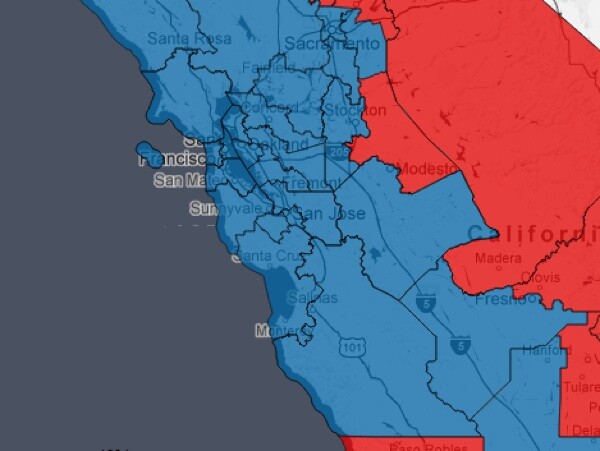California is More Blue Because of Republican-Backed Prop 20

I owe the GOP a debt of gratitude. Its steadfast support for and financial backing of the 2010 Proposition 20, dubbed the VOTERS FIRST Act for Congress, generated a tectonic shift in the state's political landscape -- and altered the meaning of my vote.
In a good way, a startling consequence I did not foresee. Neither did the Republicans who threw millions of dollars into the campaign for its passage. Indeed, that money and the support it represented was why I opposed the initiative. The proposed redistricting of congressional and state legislative seats seemed a direct attack on the hold that the Democratic Party has had on the Golden State; I feared it because Republicans favored it.
We were both wrong, and decidedly so. Proposition 20, which passed 61.3% to 38.7%, led to the creation of a citizen commission charged with redrawing each political district along what the legislation described as a "community of interest." This principled group withstood enormous pressure from all sorts of vested folks, not least from the very party that had so assiduously promoted the legislation.
When their work was completed, the bright lines they drew around these communities of interest clarified what should have been obvious, even to me: California is a very blue . Two years earlier, in advance of the 2008 presidential election,the Secretary of State reported that 44.4 percent of voters had registered as Democrats; 31.4 percent as Republicans; and 19.9 indicated no party preference.
Prop 20's proponents and opponents should have recognized that almost any redrawing of the districts would favor the Democratic Party. especially the GOP should have recognized that they were opening the door for the resulting new Democratic super-majorities in Sacramento.
These bold new lines are most visible in Claremont, the left-leaning academic arcadia on the eastern edge of Los Angeles County. In 2008, as Barack Obama rolled up California on his way to winning the White House, the "City of Trees and Ph.Ds" contributed its fair share to his historic victory.
Down-ballot was a very different story. Our congressional representative wasDavid Dreier (R-San Dimas), a deeply conservative operative who two years later would hold a leadership position in the resurgent, Republican-controlled House of Representatives. Our State Senator wasBob Huff (R-Diamond Bar) and State Assemblyman was Anthony Adams (R-Hesperia) to be replaced two years later by the gun-toting Tim Donnelly(R-Twin Peaks), a self-styled Minuteman and Tea-Party darling. Claremont felt besieged.
No more. Proposition 20 ushered the town and its neighboring communities into a new alignment for a New America.
By this dawn's early light my fellow citizens and I awoke to a rainbow's worth of diverse representation -- with an African-American President and two white women as U. S. Senators, our Congresswoman is Judy Chu (D-El Monte); our State Senator is Carol Liu (D-La Canada-Flintridge); and our State Assemblyman is another African American, Chris Holden (D-Pasadena).
I can empathize with those for whom this Democratic sweep is not a joyful occasion. I lived in rocket-red Texas for 26 years and know how it feels to think your vote doesn't count.
For Republicans in California, the pain must be especially sharp: they did this to themselves.
Char Miller is the Director and W.M. Keck Professor of Environmental Analysis at Pomona College, author of "Public Lands, Public Debates: A Century of Controversy" (Oregon State University Press), and editor of "Cities and Nature in the American West." He comments every week on environmental issues. He writes regularly on environmental issues for KCET here


